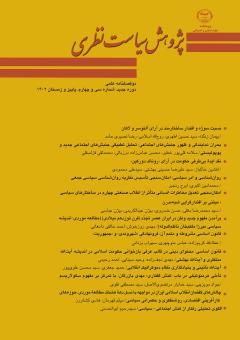چالشهای گفتمان انقلاب اسلامی ایران در مواجهه با نسل دهۀ هشتاد (مطالعۀ موردی: حوزههای کارآفرینیِ اقتصادی، روشنفکری و حکمرانی سیاسی)
محورهای موضوعی : پژوهش سیاست نظری
1 - استادیار پژوهشی گروه مطالعات تاریخی انقلاب اسلامی (مرکز اسناد انقلاب اسلامی)، ایران
2 - دانشآموخته دکتری جامعهشناسی سیاسی دانشگاه تهران، ایران
کلید واژه: نسل دهۀ هشتاد, رویکرد معرفتشناسانه (روش استعلایی), رویکرد غیر معرفتشناسانه (روش درونماندگار), روشنفکر خاص, جمهوری اسلامی ایران.,
چکیده مقاله :
حکومتهای دینی نظیر جمهوری اسلامی ایران برای بازتولید کارآمدیشان از یکسو نیازمند معانی عمیقیاند که محصول استدلالهای معرفتشناختیِ اسلامی خاصی است و از سوی دیگر به سوژههای حقوقیای نیاز دارند که اقناع این معانی معرفتی شده باشند؛ در حالی که در جهانِ حاد واقعیِ امروزی و با ظهور نسلهایی با هویتهای سیّال و مجازی، معانی عمیق معرفتی در حوزههای مختلف با چالشهای جدیای روبهرو شده و روزبهروز نقششان در زندگی انسانها کمرنگتر میشود. بر این اساس در این مقاله میکوشیم تا با مبنا قرار دادن ویژگیهای نسل دهۀ هشتاد (که با سیّالیت و مجازیت خود بهندرت جایگاهی حقوقی و معرفتی را اشغال میکنند)، ابتدا تغییرات شکلگرفته در سه حوزۀ کارآفرینی، روشنفکری و حکمرانی سیاسی را بررسی کنیم و سپس به تحولاتی که گفتمان انقلاب اسلامی در این شرایط نوظهور باید به خود گیرد، بپردازیم. به طور کلی یافتههای تحقیق بیانگر آن است که کمرنگشدن معانی عمیق معرفتی نزد نسل دهۀ هشتاد، ضمن آنکه مباحث معرفتشناختیِ روشنفکران عام را به حاشیه میبرد و فضا را برای ظهور روشنفکران خاص فراهم میکند، در حوزۀ اقتصادی موجب شکلگیری اقتصاد استارتآپی و ظهور نوع جدیدی از کارآفرینیِ پُرخطر به نام کارآفرینیِ زنجیرهای میشود. بهتبع این تحولات، در حوزۀ «حکمرانی سیاسی» نیز حکومت کردنِ کمهزینه و کارآمد بر سوژههای دهۀ هشتادی مستلزم عبور از قاعدههای کلی و معرفتشناختی و تبدیل حکومت اسلامی به حکومتمندی اسلامی است.
The Challenges of the Discourse of the Islamic Revolution of Iran in Relation to the Generation of the 1980s: A Case Study of Economic Entrepreneurship, Intellectualism, and Political Governance
Meisam Ghahraman*
Hadi Keshavarz**
Religious governments such as the Islamic Republic of Iran require, on one hand, profound meanings derived from specific Islamic epistemological arguments for their effective reproduction, while on the other hand, they need legal subjects who are persuaded by these epistemic meanings. However, in today's acute reality, with the emergence of generations possessing fluid and virtual identities, deep epistemological meanings across various domains face serious challenges, gradually diminishing their role in human life. Accordingly, this article aims to investigate the changes occurring in three areas—economic entrepreneurship, intellectualism, and political governance—by focusing on the characteristics of the generation of the 1980s, which rarely occupy legal and epistemic positions due to their fluidity and virtuality. Following this analysis, we will address the transformations that the discourse of the Islamic Revolution must undergo in these emerging conditions. Overall, the findings indicate that the fading of deep epistemological meanings among the generation of the 1980s not only marginalizes the general epistemological discussions of intellectuals but also creates space for the emergence of specific intellectuals. In the economic domain, this shift results in the formation of a startup economy and the emergence of a new and high-risk type of entrepreneurship known as chain entrepreneurship. Consequently, in the realm of political governance, the need for low-cost and efficient governance over the subjects of the 1980s necessitates a departure from general and epistemological rules, transforming Islamic governance into Islamic governance management.
Keywords: eneration of the 1980s, Epistemological Approach (Transcendental Method), Non-Epistemological Approach (Inherently Methodological), Specific Intellectual, Islamic Republic of Iran.
Meisam.ghahreman@gmail.com
** PhD in Political Sociology, University of Tehran, Iran.
h_keshavarz@ut.ac.ir
